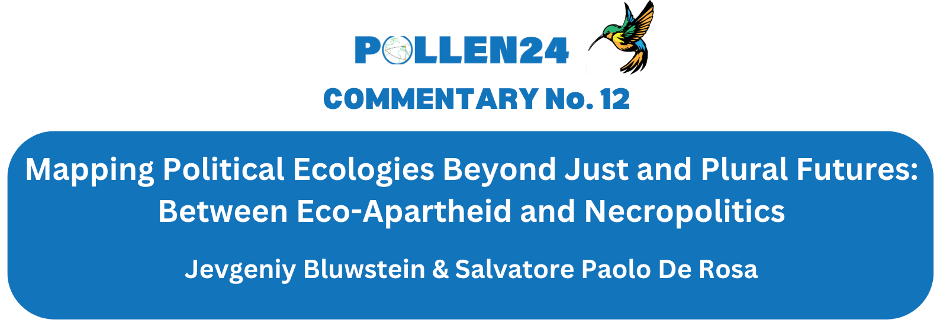2024-05-11
Mapping Political Ecologies Beyond Just and Plural Futures: Between Eco-Apartheid and Necropolitics

Abstract
Mapping Political Ecologies Beyond Just and Plural Futures: Between Eco-Apartheid and Necropolitics
In the forthcoming introduction to a Special Issue we edited for Geoforum (Bluwstein and De Rosa, forthcoming), we argue that while the flourishing of imaginative political ecologies around alternative, just and emancipatory futures is a welcome and a much needed antidote to “capitalist realism”, the envisioning of just futures is not enough for a political ecology of the future. Given that the intersections of capitalism, (neo)colonialism, patriarchy and racism continue to shape the state and corporate responses to multiple and compounding socioecological crises, a political ecology of the future must critically analyze bio- and necropolitical ecological futures already in the making today. Despite a widespread consensus within the political ecological community of practice that radical transformations towards post-capitalist and post-growth economies are urgently needed, the Special Issue maintains that capitalism will not simply collapse under the weight of its socioecological contradictions towards something better, but likely transform into something worse (see also Wark, 2019; Varoufakis, 2023).
Our invitation to critical scholars, therefore, is to pay closer attention to the material interventions, ideological formations and eco-political designs that underpin the making of political ecological futures. As Achille Mbembe (2021: 12) argues, we need to focus on those “contemporary process whereby power is constituted, expressed, and reconfigured, and acts and reproduces itself as a geomorphic force”. A political ecology of the future, in other words, must pay attention to how climate and ecological breakdown will continue to be managed through the incorporation of life and death into novel architectures of control and partition, often pivoting on discourses of security.
A central concern of such a research agenda should address the ways in which social fears of apocalyptic futures are increasingly instrumentalized in an “anticipatory politics” (Anderson, 2010) to justify interventions in the present aimed at securing the continuous dominance of current hegemonic formations and of those who have historically benefited from them. For Kasia Paprocki this contemporary mode of governance is best understood as anticipatory ruination, “a discursive and material process of social and ecological destruction in anticipation of real or perceived threats” (Paprocki, 2019: 296). The obliteration of certain people(s), lands and territories in the present becomes thus justified by the mission of averting catastrophic futures. If uncontested, the inertia of the capitalist-colonial present will “colonize the future” (Demos, 2023; Hayes, 2016) through symbolic and material interventions in the name of environmental action and security. The ways in which such futures are being made in the present and the mapping of points of intervention to avert them, is what we think deserves our utmost consideration.
Recent contributions in critical social sciences and humanities have already provided several conceptual inroads to chart the political ecologies of the future. Wainwright’ and Mann’s Climate Leviathan (2018) is a pathbreaking example of critical future-oriented political ecological scholarship, in which the authors speculate about how global climate politics may adapt to runaway climate change. Extending their work, DeBoom (2021) proposes the framework of "climate necropolitics" to analyse how extractive violence is rendered legitimate in the name of climate mitigation, directing our attention to the geographies and legitimation strategies of various forms of environmental management for the future. Green industrial policies are likely to lead to “green sacrifice zones”, "reproducing a form of climate colonialism in the name of just transition" (Zografos and Robbins 2020: 543). A political ecology of green growth, green energy transitions and green extractivism will have to pay attention to how resistance to green sacrifice zones will be managed (Dunlap, 2023). Dispossession, violence and coercion linked to climate change mitigation may also become inherent to projects of large-scale carbon sequestration in soils and forests, especially those turning rural areas in the Global South into capitalized carbon sinks, while their populations are rendered surplus (Bluwstein and Cavanagh, 2023). When climate mitigation fails, the re-engineering of the atmosphere in form of carbon dioxide removal and solar radiation management will likely be a major driver for militarized geopolitical ecologies (Sovacool et al., 2023; Surprise, 2020).
A political ecology of the future will thus inevitably have to grapple with the rise of eco- and climate apartheid. Rice et al. (2021: 627) define climate apartheid “as an emerging system of discrimination, segregation, and violence based on various axes of oppression and privilege (race, class, gender, sexuality) that is produced by the material effects of climate change, but also many responses to the crisis”. The authors add that “this coproduces two populations: the climate privileged, those with the wealth and subject positions to insulate themselves from the greatest threats of climate change, and perhaps even profit from them; and the climate precarious, those whose social status and lack of access to safe and resilient infrastructures may facilitate or exacerbate their vulnerability, harm, or displacement.” (Rice et al., 2021: 627)
A political ecology of the future will thus also have to go beyond a well-established focus on the 'history of the present', one of the key strengths of critical social sciences and humanities. Instead, we argue, a political ecology of the future must redirect our attention towards a politically salient and epistemologically fruitful focus on the ‘history of the future’: unearthing present foundations, structures, discourses, processes and social formations that shape specific future trajectories, likely to become entrenched in the absence of successful contestation and reversal.
As Alyssa Battistoni and Geoff Mann (2023: 77) insist, global heating “is reshaping the terrain on which we will be fighting in the years to come, and we have only begun to consider what this will mean”. It is in this spirit that we hope a resurgent interest towards a critical examination of the capitalist-colonial present can help us clarify what the political ecological terrain will look like in the future. Besides a sustained focus on imaginative, alternative and just political ecological futures, we believe that the responsibility of political ecology as a community of practice lies in a critical examination of the future-shaping dynamics of the authoritarian, capitalist and (settler)colonial present.
Notes
[1] Senior Researcher, Institut of Social Anthropology, University of Bern, Switzerland. jevgeniy.bluwstein@unibe.ch
[2]Postdoc, Center for Applied Ecological Thinking, Department of Cross-Cultural and Regional Studies, University of Copenhagen, Denmark. spdr@hum.ku.dk
References
Anderson, B., 2010. Preemption, precaution, preparedness: Anticipatory action and future geographies. Progress in Human Geography 34(6): 777–798.
Battistoni, A., & Mann, G., 2023. Climate Bidenomics. New Left Review 143, 55-77
Bluwstein, J. & Cavanagh, C., 2023. Rescaling the land rush? Global political ecologies of land use and cover change in key scenario archetypes for achieving the 1.5 °C Paris agreement target, The Journal of Peasant Studies, 50 (1), 262-294. 10.1080/03066150.2022.2125386
Bluwstein, J. & De Rosa, S. P., forthcoming. Political Ecologies of the Future: An Introduction to the Special Issue. Geoforum
DeBoom, M. J., 2021. Climate Necropolitics: Ecological Civilization and the Distributive Geographies of Extractive Violence in the Anthropocene. Annals of the American Association of Geographers, 111 (3), 900-912. 10.1080/24694452.2020.1843995
Demos, T., 2023. Radical Futurisms. Ecologies of Collapse, Chronopolitics, and Justice-to-Come. Sternberg Press.
Dunlap, A., 2023. The green economy as counterinsurgency, or the ontological power affirming permanent ecological catastrophe. Environmental Science & Policy, 139, 39-50.
Hayes, B. 2016. “Colonising the future: Climate change and international security strategies", 39-62 in Buxton, N., and Hayes, B. (Eds). The Secure and The Dispossessed. How the Military and Corporations are Shaping a Climate-Changed World. PlutoPress
Mbembe, A., 2021. Futures of life and futures of reason. Public Culture, 33 (1), 11-33.
Paprocki, K., 2019. All That Is Solid Melts into the Bay: Anticipatory Ruination and Climate Change Adaptation. Antipode, 51 (1), 295-315. https://doi.org/10.1111/anti.12421
Rice, J. L., Long, J., & Levenda, A., 2021. Against climate apartheid: Confronting the persistent legacies of expendability for climate justice. Environment and Planning E: Nature and Space, 5 (2), 625-645. 10.1177/2514848621999286
Sovacool, B. K., Baum, C., & Low, S., 2023. The next climate war? Statecraft, security, and weaponization in the geopolitics of a low-carbon future. Energy Strategy Reviews, 45, 101031. https://doi.org/10.1016/j.esr.2022.101031
Surprise, K., 2020. Geopolitical ecology of solar geoengineering: from a 'logic of multilateralism' to logics of militarization. Journal of Political Ecology, 27 (1), 213-235.
Varoufakis, Y., 2023. Technofeudalism: What killed capitalism. Random House.
Wainwright, J., & Mann, G., 2018. Climate Leviathan: A political theory of our planetary future: Verso Books.
Wark, M., 2021. Capital is dead: Is this something worse? Verso.
Zografos, C., & Robbins, P., 2020. Green Sacrifice Zones, or Why a Green New Deal Cannot Ignore the Cost Shifts of Just Transitions. One Earth, 3 (5), 543-546. 10.1016/j.oneear.2020.10.012
